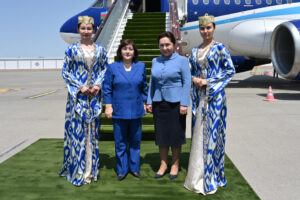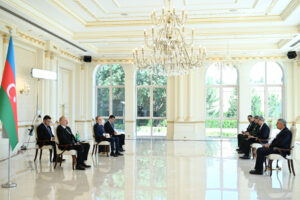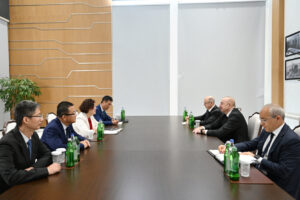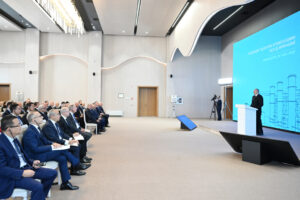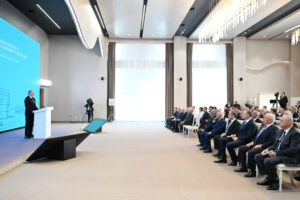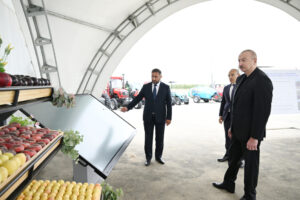Tokyo, 12 May, /AJMEDIA/
A recent announcement on possible defense technology cooperation between Japan and AUKUS, a trilateral partnership among Australia, Britain and the United States, has great potential and could boost deterrence against China’s growing military assertiveness, defense experts say.
The experts say, however, it would take time for such collaboration to materialize, as Japan is already engaged in bilateral projects with the AUKUS members and a quadrilateral alliance is viewed as a long-term objective.
To maximize the potential of such a partnership and realize mutual benefits, Japan and the three-way group will need to identify technological fields in which collaboration can compensate for individual weaknesses, the experts say.
Created in 2021 in the face of Beijing’s military buildup in the Indo-Pacific region and intensifying Sino-U.S. rivalry, the AUKUS framework is aimed at delivering nuclear-powered submarines to Australia as its first pillar of cooperation.
The framework’s second pillar will bolster cooperation on advanced capabilities such as cyber defense, artificial intelligence, quantum technologies and new undersea operations.
The Australian, British and U.S. defense ministers said in a joint statement on April 8 that they were “considering cooperation with Japan on AUKUS Pillar II,” recognizing “Japan’s strengths and its close bilateral defense partnerships with all three countries.”
At a press conference in Canberra the following day, Australian Prime Minister Anthony Albanese said Japan is a “natural candidate” to be part of the second pillar, while no proposals had been made to expand first pillar membership to include it.
China was quick to react, with Foreign Ministry spokeswoman Mao Ning later that day warning of an escalating arms race and urging Japan to “abandon the practice of forming a small military and security circle.”
Japanese Defense Minister Minoru Kihara has only said that Tokyo’s possible cooperation on the second pillar “will be considered by the AUKUS side.”
A Japanese Foreign Ministry official said after the AUKUS announcement, “We have not yet decided anything and discussions on what kind of cooperation may be feasible are still to come.”
John Blaxland, director of the Australian National University’s North America Liaison Office, said if the Japan-AUKUS tie-up is realized, it would add to “the deterrent effect, which is aimed at bolstering peace and security and enhancing stability.”
The professor of international security and intelligence studies also pointed to advanced technologies and research that Japanese industries could provide, including in the areas of robotics and precision devices.
“Incorporating them into the trilateral arrangement is seen as potentially providing significant mutual advantage,” he added.
Hirohito Ogi, a senior research fellow at the Asia Pacific Initiative and Institute of Geoeconomics at the International House of Japan, said the shared assessment of Tokyo and AUKUS members regarding the regional security environment can provide a basis for their four-way collaboration.
Japan has been focusing on developing new defense technologies similar to those specified as part of the AUKUS second pillar, especially since the updating of its National Security Strategy in 2022 that called for bolstering the country’s defense capabilities in the face of growing threats from North Korea and Russia as well as China.
Given the “overlapping of directions” of Japan and AUKUS, their collaboration on innovative technology would be beneficial to both sides, Ogi said.
A former Japanese Defense Ministry official, Ogi said the AUKUS defense chiefs only said they are “considering” cooperation with Japan, indicating its participation could still be in the early stages.
Aside from its close security ally Washington, Tokyo is already working with London and Canberra on defense collaboration, he added.
The joint projects include development of an interceptor missile for hypersonic projectiles with the United States, a next-generation fighter jet with Britain and Italy, and research on underwater drones with Australia.
As long as those bilateral efforts continue smoothly, Japan and the AUKUS members “seem to have little incentive” to urgently promote specific projects under a quadrilateral framework, Ogi said.
During a TV interview aired in Australia last month, Peter Dean, a professor at the United States Studies Centre at the University of Sydney, said he views protection of confidential information as “the biggest hurdle” for Japan to clear before joining AUKUS.
Japan enacted a state secrecy law in 2013 aimed at preventing unauthorized disclosure of state secrets, but the nation is viewed as lagging behind other developed countries in protecting sensitive information and cybersecurity defenses.
In the latest example, Japanese media outlets citing government sources reported in February that classified Japanese diplomatic information had been leaked following Chinese cyberattacks on the Foreign Ministry in 2020.
The AUKUS states are “dealing with some of the most highly sensitive, cutting-edge military capabilities and intelligence” and they would need to get Japan to enhance the level of its information security, Dean said.
© KYODO




